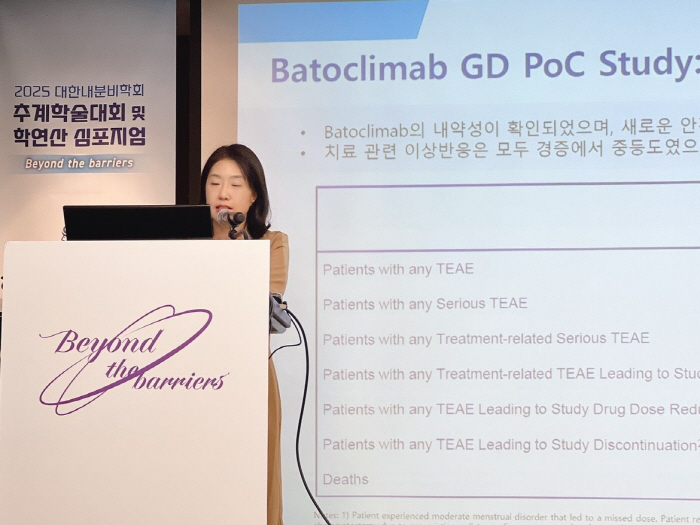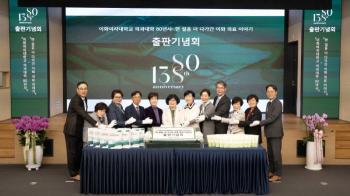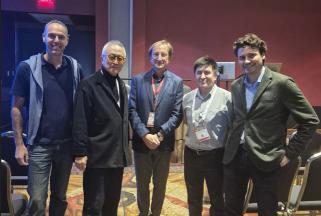Graves' disease is a great risk of recurrence...The Korean Society of Endocrinology announces the latest research results and treatment strategies for new drugs for autoimmune diseases
Nov 03, 2025
Graves' disease is a disease in which thyroid function is excessively elevated due to an autoimmune response.
Anti-thyroid drugs (ATD), developed in the 1940s, have been used as standard treatments to date. However, about 25% of all patients do not respond to drugs, so they do not have sufficient treatment effects, or they have complications or frequent recurrences such as thyroiditis, so there is a high demand for unmet needs.
Currently, it is estimated that about 20,000 patients requiring secondary treatment and about 330,000 patients with recurrence of ATD occur every year in the United States alone.
In this regard, Hanol Biopharma presented the latest data of new drugs developed in Korea at the '2025 Korean Endocrine Society Autumn Conference'.
The conference, held from October 30 to November 1, is the largest event in Korea to share the latest research results in the field of endocrine metabolism such as diabetes, obesity, lipids, thyroid gland, bone metabolism, pituitary gland, and adrenal gland, and discuss ways to cooperate.
Hanall Biopharma participated as a guest speaker in the second part of the Haksan Symposium 'Introduction to Precision Medicine and Convergence Research for Graves' Disease' held at Lotte Hotel in Busan on October 31. On this day, Kim Young-joo, head of the Global Research Center, announced the research status and clinical results of the autoimmune disease treatment 'Vatoclimab (HL161BKN)' and 'Aimeropruvat (HL161ANS)' developed by Hanol under the theme of'New Treatment Strategy for Research of Graves' Disease'.
Bartoclimab and Aimeropruvat are substances developed by Hanol Biopharma and licensed to Immunovant's parent company, Roivant, and have a mechanism to reduce pathological autoantibodies by inhibiting FcRn. Following the initial results of phase 2 clinical trials last year, vatoclimab released six-month maintenance effect data after completion of this year's administration, demonstrating the possibility of fundamental disease control.
As a result of 24 weeks of vatoclimab administration in phase 2 clinical trials, the treatment response was confirmed in 72% of patients who were not controlled by conventional anti-thyroid drugs. Thyroid hormone levels remained within the normal range in 80% of patients even at 24 weeks after administration was completed, and half of them were stable without anti-thyroid drugs. In addition, 60% of patients who received high-dose vatoclimab not only recovered their hormone levels to the normal range at 12 weeks, but also stopped taking anti-thyroid drugs.
In particular, even after completion of administration, autoantibody (TRAb), known as the main cause of the disease, remained at a reduced level, drawing attention as a new standard for patients who did not have sufficient effects with existing treatments. There were no newly reported adverse reactions during the clinical period.
Next-generation FcRn inhibitor Ameropruvat is also undergoing two registered clinical trials for Graves' disease based on vatoclimab data. Aimeropruvat has shown the same level of antibody reduction as vatoclimab in non-clinical studies, and has proven its high potential by securing consistent results in phase 1 clinical trials.
"FcRn inhibitors are innovative approaches that can target areas that have not been resolved with existing treatments by regulating autoantibodies, the root cause of the disease," said Kim Young-joo, head of the Hanall Biopharma Center. "We will lead the global development of new drugs with domestic and foreign experts and create a new paradigm for autoimmune disease treatment."
Anti-thyroid drugs (ATD), developed in the 1940s, have been used as standard treatments to date. However, about 25% of all patients do not respond to drugs, so they do not have sufficient treatment effects, or they have complications or frequent recurrences such as thyroiditis, so there is a high demand for unmet needs.
Currently, it is estimated that about 20,000 patients requiring secondary treatment and about 330,000 patients with recurrence of ATD occur every year in the United States alone.
|
The conference, held from October 30 to November 1, is the largest event in Korea to share the latest research results in the field of endocrine metabolism such as diabetes, obesity, lipids, thyroid gland, bone metabolism, pituitary gland, and adrenal gland, and discuss ways to cooperate.
Hanall Biopharma participated as a guest speaker in the second part of the Haksan Symposium 'Introduction to Precision Medicine and Convergence Research for Graves' Disease' held at Lotte Hotel in Busan on October 31. On this day, Kim Young-joo, head of the Global Research Center, announced the research status and clinical results of the autoimmune disease treatment 'Vatoclimab (HL161BKN)' and 'Aimeropruvat (HL161ANS)' developed by Hanol under the theme of'New Treatment Strategy for Research of Graves' Disease'.
Bartoclimab and Aimeropruvat are substances developed by Hanol Biopharma and licensed to Immunovant's parent company, Roivant, and have a mechanism to reduce pathological autoantibodies by inhibiting FcRn. Following the initial results of phase 2 clinical trials last year, vatoclimab released six-month maintenance effect data after completion of this year's administration, demonstrating the possibility of fundamental disease control.
As a result of 24 weeks of vatoclimab administration in phase 2 clinical trials, the treatment response was confirmed in 72% of patients who were not controlled by conventional anti-thyroid drugs. Thyroid hormone levels remained within the normal range in 80% of patients even at 24 weeks after administration was completed, and half of them were stable without anti-thyroid drugs. In addition, 60% of patients who received high-dose vatoclimab not only recovered their hormone levels to the normal range at 12 weeks, but also stopped taking anti-thyroid drugs.
In particular, even after completion of administration, autoantibody (TRAb), known as the main cause of the disease, remained at a reduced level, drawing attention as a new standard for patients who did not have sufficient effects with existing treatments. There were no newly reported adverse reactions during the clinical period.
Next-generation FcRn inhibitor Ameropruvat is also undergoing two registered clinical trials for Graves' disease based on vatoclimab data. Aimeropruvat has shown the same level of antibody reduction as vatoclimab in non-clinical studies, and has proven its high potential by securing consistent results in phase 1 clinical trials.
"FcRn inhibitors are innovative approaches that can target areas that have not been resolved with existing treatments by regulating autoantibodies, the root cause of the disease," said Kim Young-joo, head of the Hanall Biopharma Center. "We will lead the global development of new drugs with domestic and foreign experts and create a new paradigm for autoimmune disease treatment."
This article was translated by Naver AI translator.














